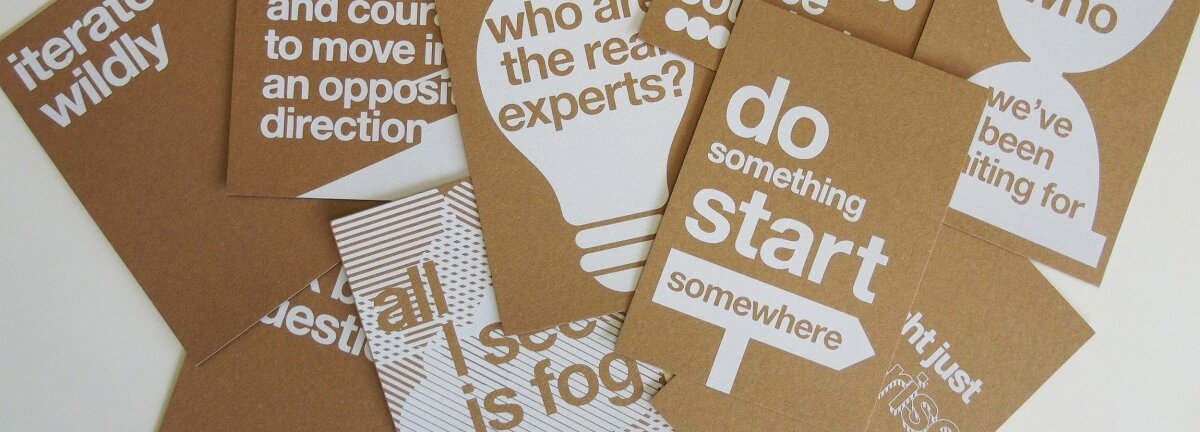Knee High Design Challenge: 8 cards open up design debate

There are many people working within organisations with the potential to create great change - but often without belief in themselves, the support of those around them, or the opportunities to make sense of their power and potential. We wanted to help more creative, compassionate and courageous people at Lambeth and Southwark councils meet each other.
So the Knee High Design Challenge team set up an event - Do Something, Start Somewhere - to bring these people together, share tales of trying to change what can feel like an unchangeable system, and hatch plans for a collective effort to make our Public Sector a place that works better for people. The event formed an experimental start to what might be an experimental network. It felt exciting, and it felt needed.
To help provoke and inspire people we also created an anti-design process set of cards, explaining how innovative practice in the Public Sector, contrary to what so many innovation toolkits tell us, is not a linear process with a sequence of simple steps. It’s actually a chaotic and often terrifying muddle of risk and harsh realities, of unknowns and urgency. It takes incredible courage, conviction, ambition and common sense. It takes faith and intelligence as well as instinct and a deep compassion for and relationship with the people the system is aiming to serve.
We made some cards. Not rocket science - but a series of clues to the attitudes and behaviours of innovative thinkers in the social and public sector.
Following are eight of the key cards we took to the event:
The power to influence and shape society should belong to everyone. But too many people, on a daily basis, feel unable to make choices, make changes, or get their voices heard.
Are we doing enough in work and life to ensure that agency genuinely belongs to the many, not the few? What more could we do to ensure people everywhere have the opportunities to express and realise ideas? Where could power be removed or distributed in a different way?
The very first step in making ideas a reality is often the hardest. So many possibilities go unrealised because that step towards making something happen feels disproportionately complex. Support around this early stage is often the most transformative, and funding is not the always the strongest enabler. People need to feel safe enough to take a risk; trusted and challenged; encouraged to keep going when the way back looks easier than the way forward; and part of something bigger than themselves.
As Albert Einstein so eloquently put it: “If I had an hour to solve a problem I'd spend 55 minutes thinking about the problem and 5 minutes thinking about solutions.” Sometimes we find ourselves working so hard on trying to find solutions, we fail to see and hear the insights that will reveal to us the depth and gravity of the real problems.
Designers often use frameworks to help describe the process of creating new products and services: from research, to analysis, to ideas, to testing, to delivery. It sounds so simple. But no linear process will help you when things feel uncertain, unknown, unfamiliar and terrifying. We call this the fog of uncertainty. It is the feeling you get when surrounded by conflicting, movable and unplannable elements.
Enter the fog with faith, trust and agility.
The vision doesn’t change, but how you get there might.
You, and the people you know best, are not always the people with the best ideas or the most relevant perspectives.
Be open to where the best ideas come from. Look for the people with the stories and experiences that hold the insight you don’t have. Listen properly. Spot people’s potential. Create space for this potential to turn into something.
Expertise can be found in every single human. Don’t assume otherwise.
The sooner ideas are mocked up and tested with people, the sooner we learn what works and what doesn’t. The cheaper mistakes are, and the easier they are to fix.
Prototyping is a familiar concept within design. And there are lots of opportunities to bring the principles and tools of prototyping into the public sector. But you need to commit time and be genuinely open to learning.
Think big, start small, move fast. Try something, experiment, be open to the feedback that comes. Also be prepared to let go of your ideas - welcome people into the creation and shaping of them.If something can’t be evaluated within existing modes or frameworks, it doesn’t mean it has no value.
Innovative practice requires some new models for evaluation. It requires some open minded and collaborative commissioners who want to embark on the journey of learning and improvement. It needs practitioners who are going to work with researchers and evaluators to develop new ways of working together.
Use evaluation as a tool to improve, not a tool to judge.
Success should not be dependent on the scale and magnitude of an idea. Being big quickly does not mean being effective. In fact it can mean the opposite.
There are many models that support sustainable and expandable social value, based on the growth of networks and relationships and sharing ideas. Initially small ideas can spread and lead to significant long term effects if given the conditions and the support to grow.
The Design Council Challenges team aims to better support those across the public and social sector to deliver real change through design.
If you’re interested in this work, want to get involved or use the Challenges approach, feel free to get in touch.
Subscribe to our newsletter
Want to keep up with the latest from the Design Council?
